 |
Access to all Cedefop online tools. |
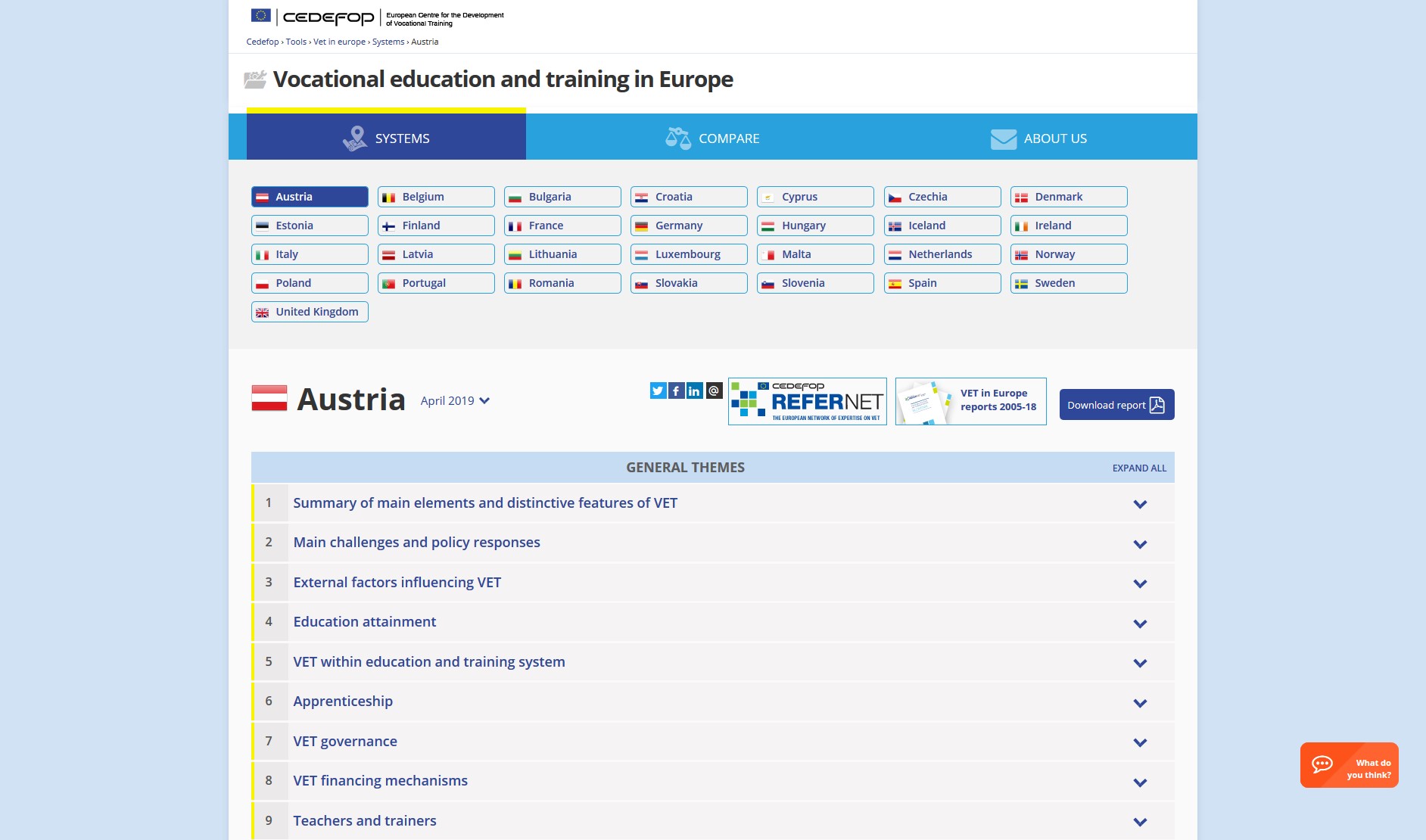 |
Vocational education and training in Europe In "Vocational education and training in Europe" the vocational training systems of 27 EU countries + Iceland and Norway are comprehensively presented. Structured according to various topics (e.g. apprenticeship or guidance and counselling), country-specific information can be queried and also compared directly with information from another country. Graphics provide a quick overview of the respective education systems. In addition, all information can be exported to a pdf file. The database was created in cooperation with the national ReferNet partners (for Austria ReferNet Austria). |
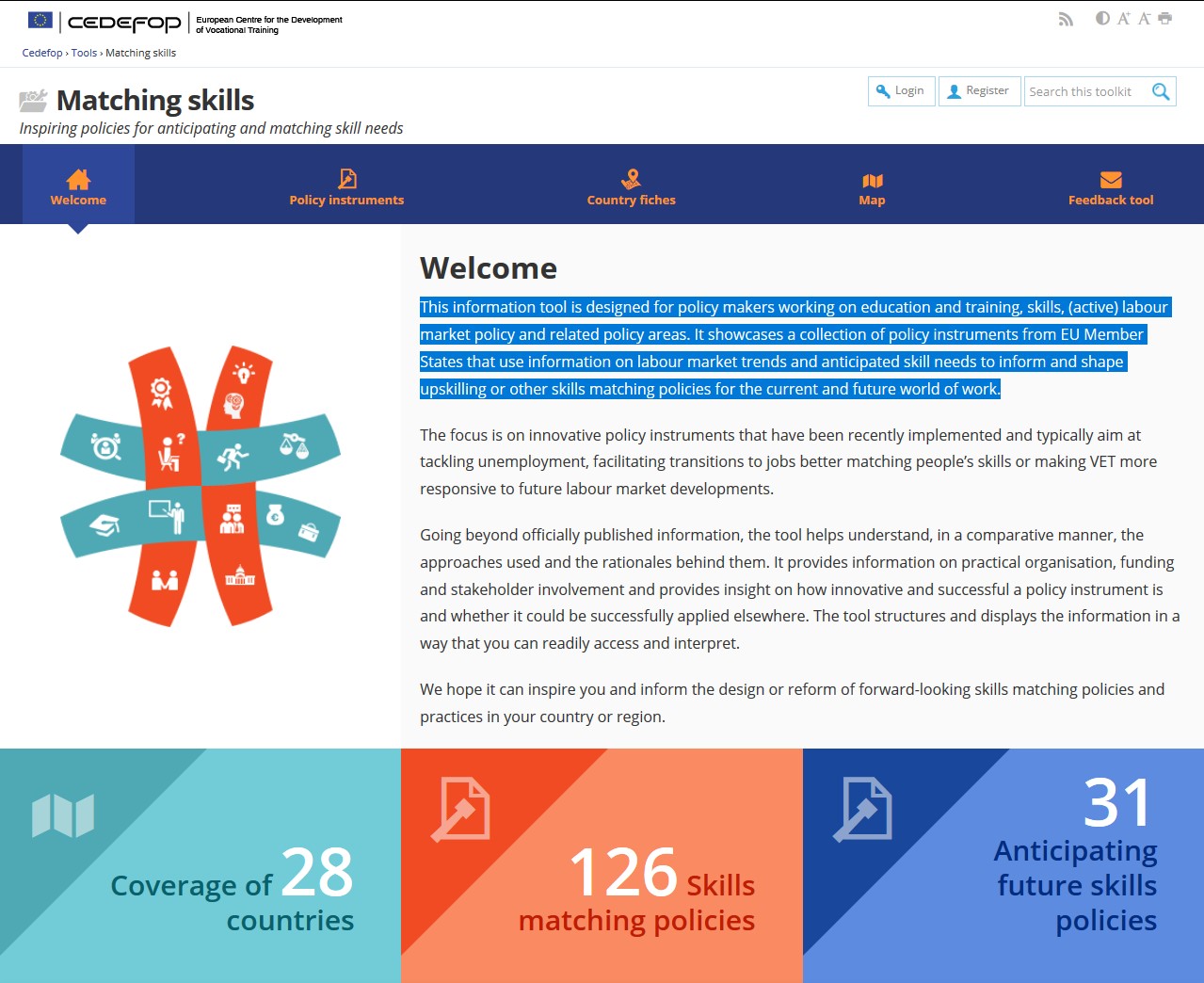 |
Matching skills The Cedefop information tool ‘Matching skills: Inspiring policies for anticipating and matching skill needs’ is aimed at policy makers working in education and training, qualifications, (active) labour market policy and related policy areas. It contains a collection of policy instruments from the EU Member States that use information on labour market trends and projected skills needs to develop measures to upgrade or adapt skills to the current and future world of work. The focus is on innovative tools and instruments that have recently been introduced and that aim to better adapt VET to future labour market developments and to tackle unemployment. |
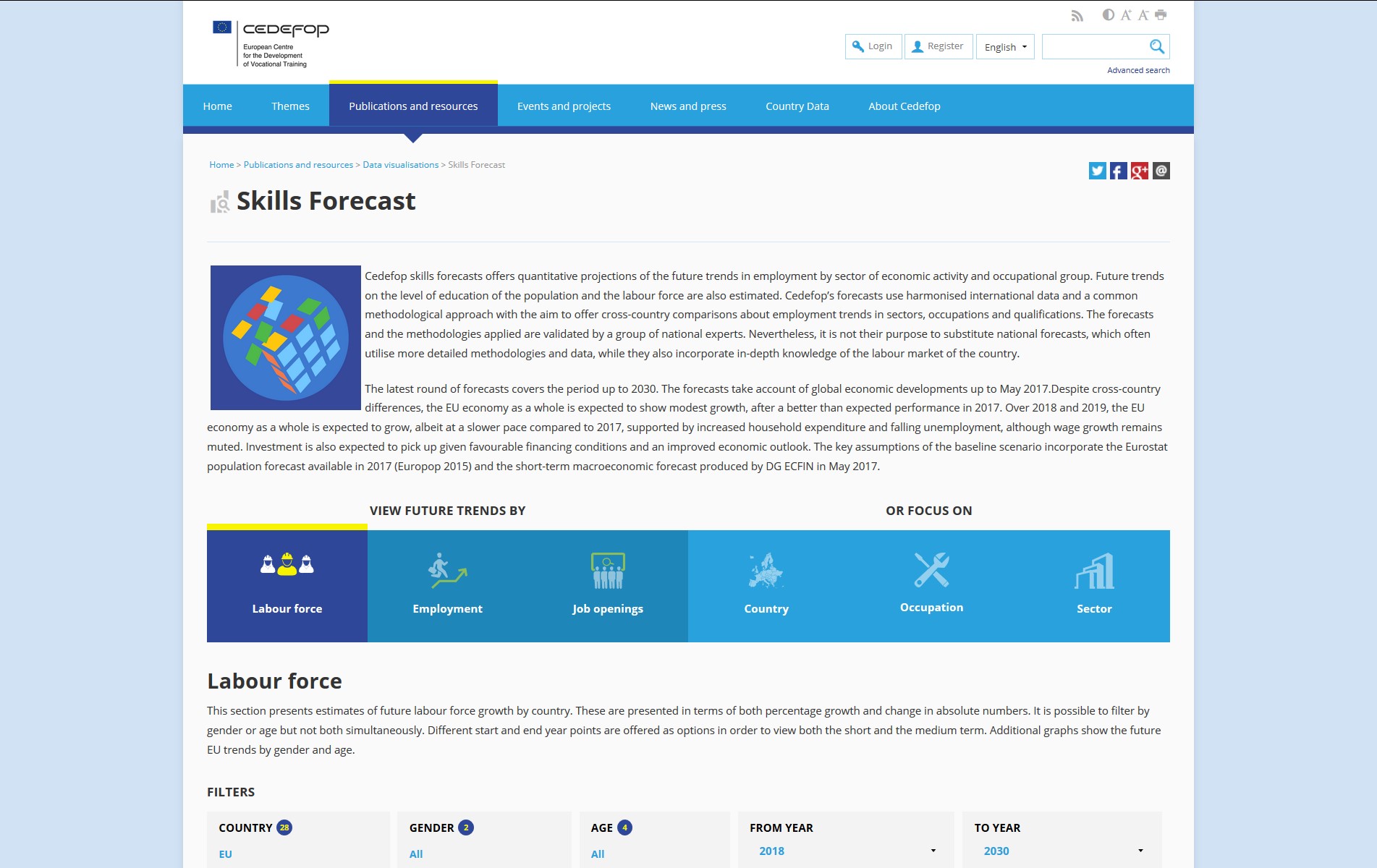 |
Skills forecast Cedefop skills forecast tool offers quantitative projections of the future trends in employment by sector of economic activity and occupational group until 2030. It also includes estimations concerning education trends of the population and the labour force. The cross-country comparison is based on a common methodological approach and harmonised international data. It doesn’t claim to substitute national forecasts, which utilise more detailed methodologies and country specific in-depth data of the labour market. |
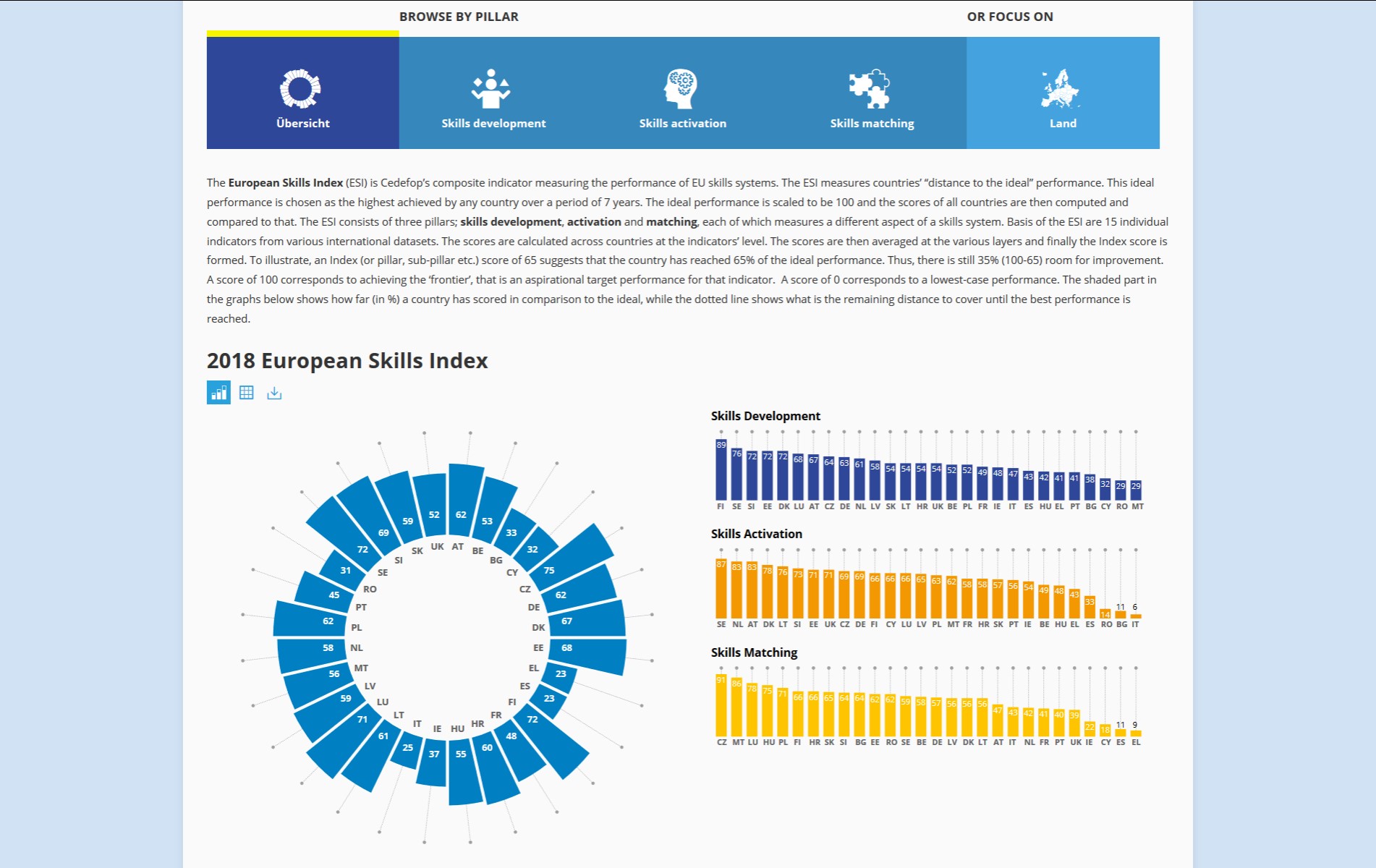 |
European skills index The European Skills Index (ESI) generated by Cedefop is a composite indicator measuring the performance of the skills systems of the EU member states. The ESI consists of three pillars: skills development, skills activation and skills matching. Basis of the ESI are 15 individual indicators from various international datasets. The scores are calculated across countries at the indicators’ level, averaged and finally the Index score is formed. The "ideal performance" is scaled to be 100. The ESI measures the country specific “distance to the theoretical ideal. |
 |
Timeline of VET policies in Europe The Timeline of VET policies in Europe is a rich collection of strategies, action plans, legal acts, regulations, and practical measures in vocational education and training (VET) and lifelong learning (LLL) in the EU Member States, Iceland and Norway. Policy-makers, analysts and practitioners in VET and LLL can learn about and explore national initiatives on various themes, and how these are linked to European priorities in VET, expressed in the Council Recommendation on VET and the Osnabrück Declaration. The information is presented as a timeline that helps observe how policies and practices develop over the years and through different stages, from design through implementation to completion. Information is organised in thematic categories allowing for filtering and comparison of the policies and practices presented by different criteria, such as country or target group. |
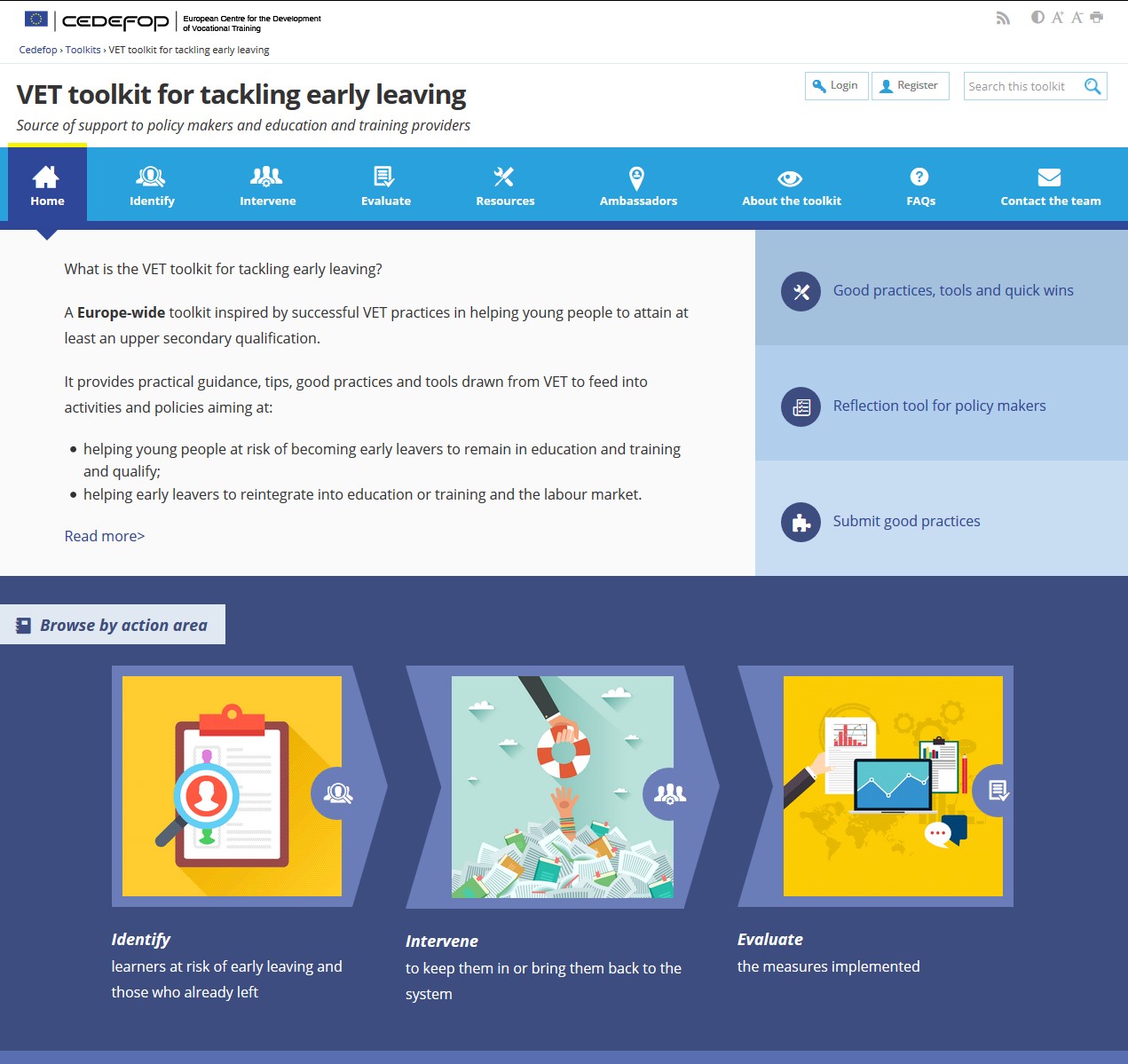 |
VET toolkit for tackling early leaving The European VET toolkit for tackling early leaving collects successful VET practices in helping young people to attain at least an upper secondary qualification. The toolkit provides practical guidance, good practices and tools drawn from VET aiming at support young people at risk of becoming early leavers to achieve at least a qualification at the upper secondary level and early leavers to reintegrate into education or training and the labour market. It addresses policy-makers and practitioners (e.g. ministries, VET schools, companies, guidance centres, public employment services) in order to identify and support early leavers and learners at risk of leaving education and to evaluate related measures undertaken within a country, region or institution. |
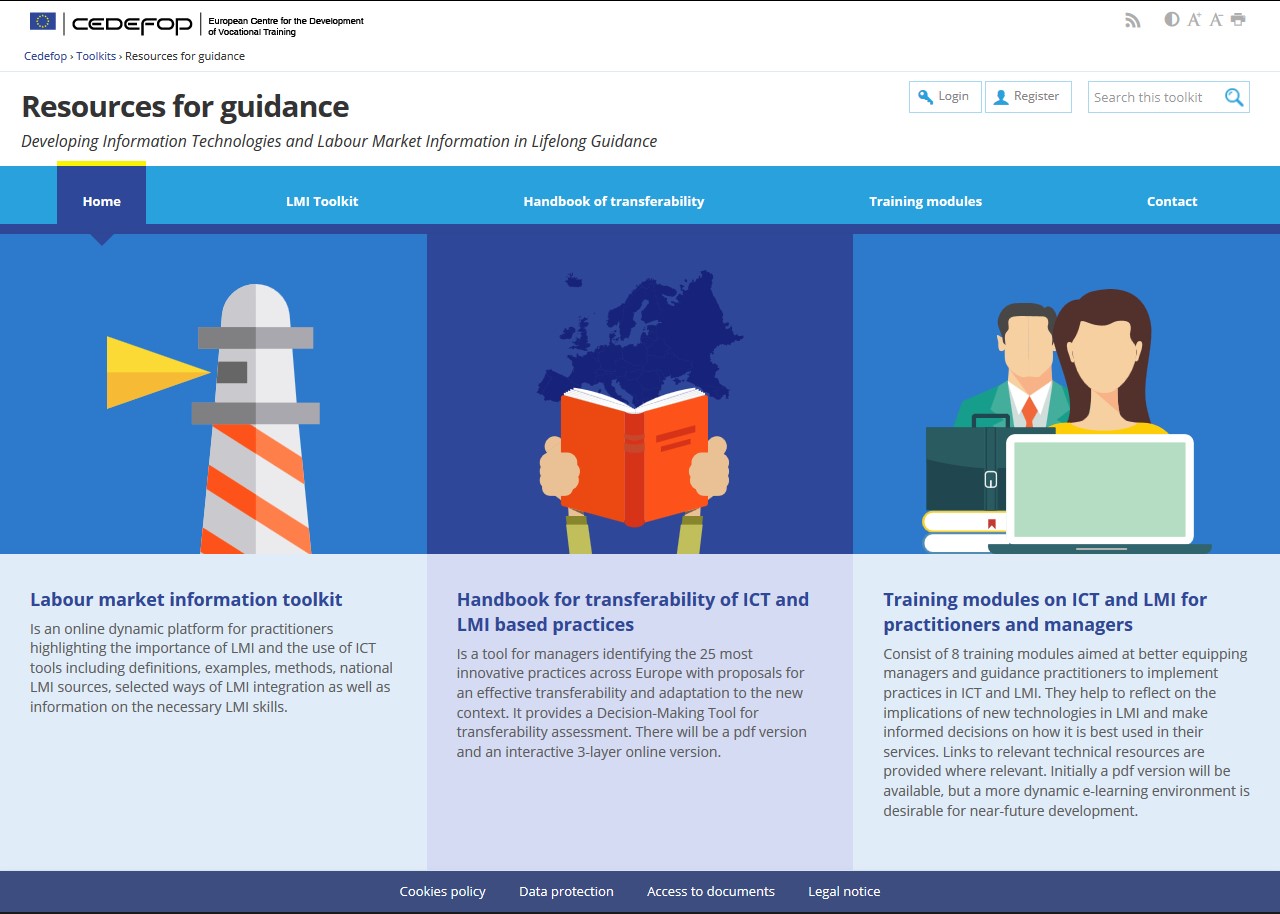 |
The Cedefop tool for Developing and Application of Information Technologies and Labour Market Information in Lifelong Guidance provides access to three different tools: Labour market information (LMI) toolkit: online dynamic platform for practitioners highlighting the importance of LMI and ICT tools by presenting examples, methods, national LMI sources and selected ways of LMI integration as well as information on the necessary LMI skills. Handbook for transferability of ICT and LMI based practices: tool for managers identifying the 25 innovative practices across Europe with proposals for an effective transferability and adaptation to the respective national context. It also provides a Decision-Making Tool for transferability assessment. Training modules on ICT and LMI for practitioners and managers: consist of 8 training modules aimed at better equipping managers and guidance practitioners to implement practices in ICT and LMI. |
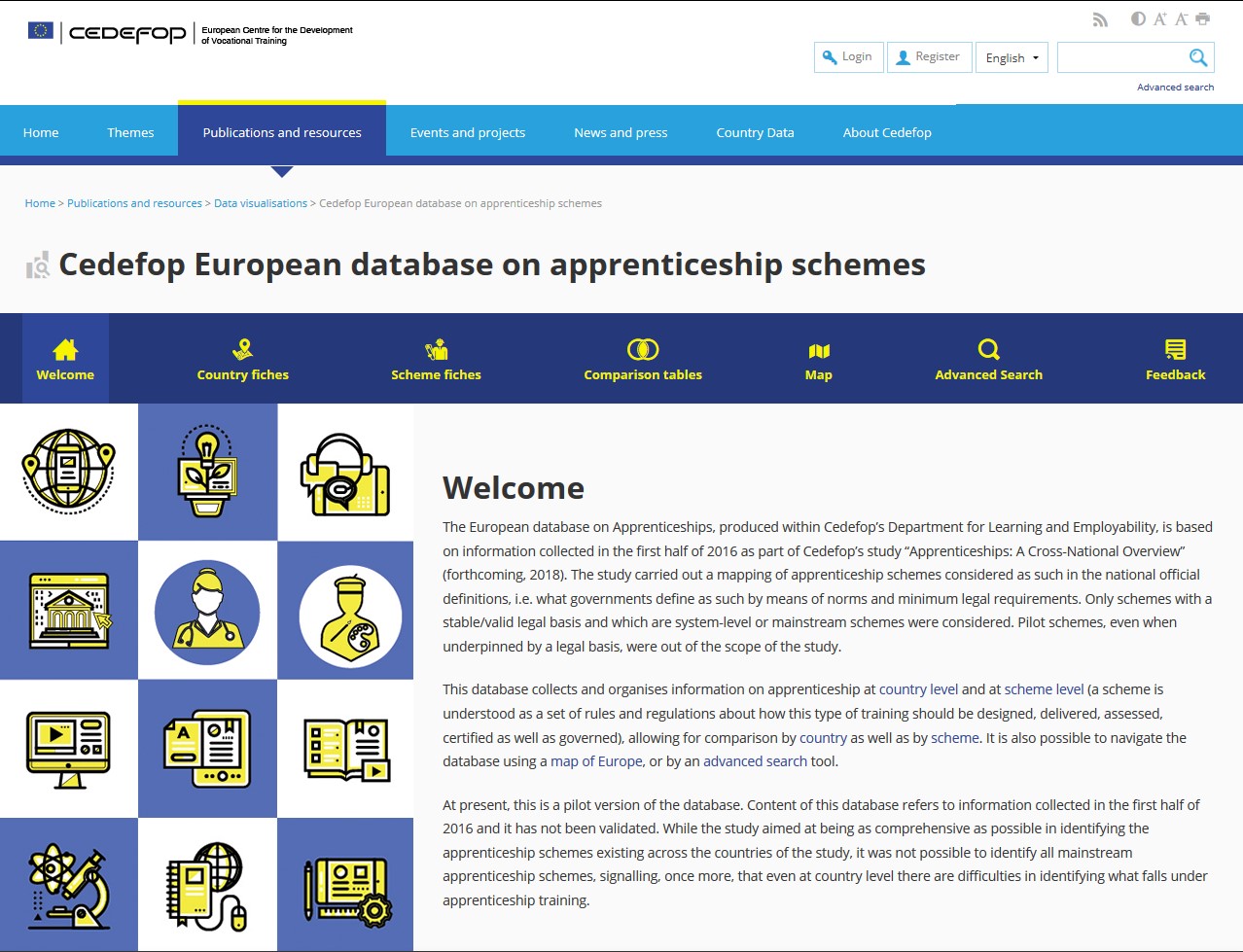 |
Cedefop European database on apprenticeship schemes The European database on apprenticeship schemes collects and presents structured and comparable information on apprenticeship schemes on country and scheme level of the EU Member States plus Iceland, Norway and the UK. Information can be also retrieved through the map of Europe or by an advanced search tool. The database contains only apprenticeship schemes considered as such in the national official definitions, i.e. defined by national governments as such by means of norms and minimum legal requirements. Complementary the Cedefop’s database on financing apprenticeships in the EU provides information on how apprenticeship schemes are financed in the EU Member States and the UK. |
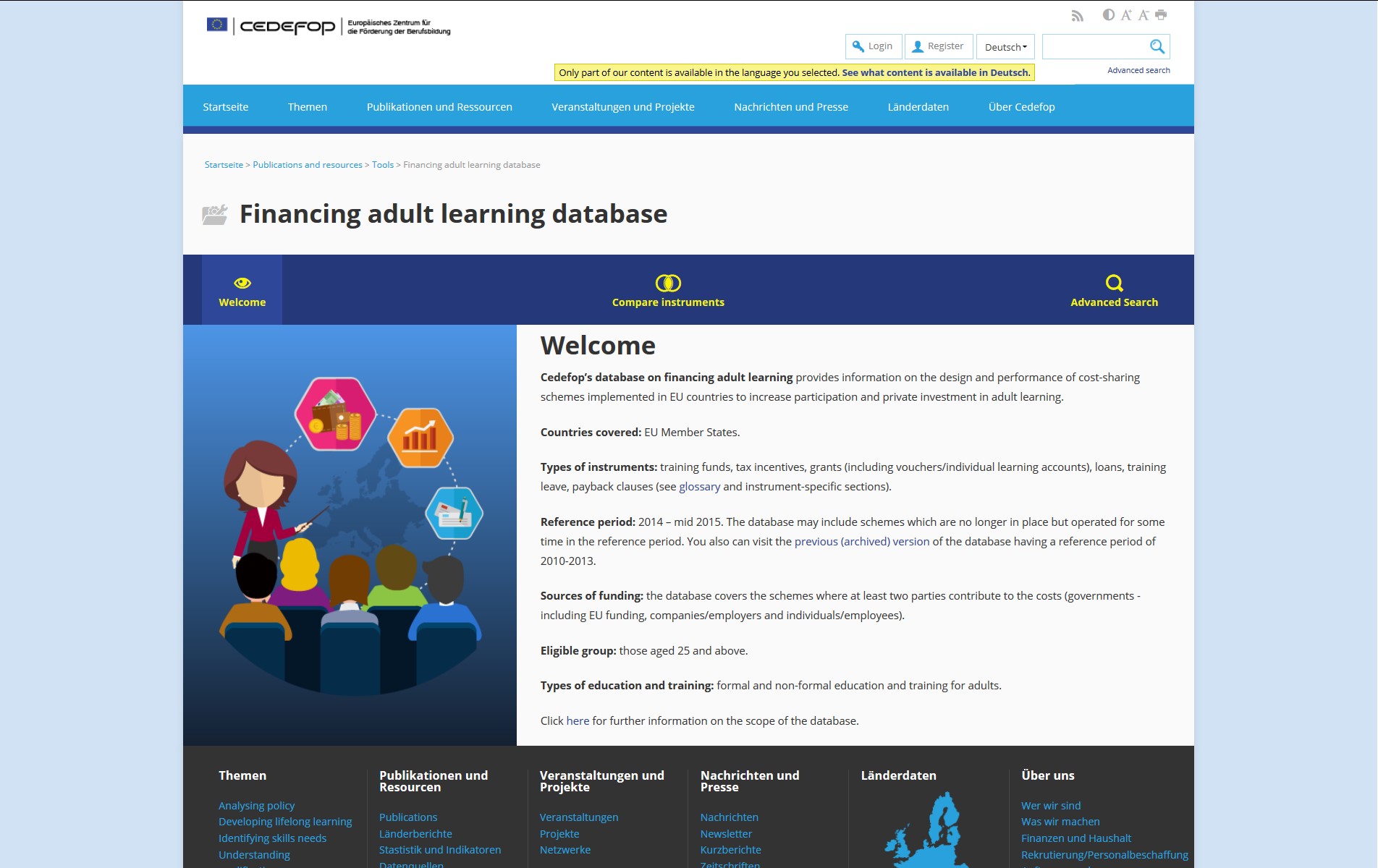 |
Financing adult learning database The Cedefop’s database on financing adult learning provides information on the design and performance of cost-sharing schemes for peolple aged 25 and above implemented in EU countries to increase participation and private investment in adult learning. As the reference period covers the years 2014-mid 2015, it may also contain instruments which are no longer in place. The database includes various types of instruments (e.g. training funds, tax incentives, grants, loans) as well in the formal and non-formal education and training sector for adults. The database offers a quiry to compare instruments, a search by map and an advanced search by different criteria. A glossary refering financial instruments in adult learning complements the database. |
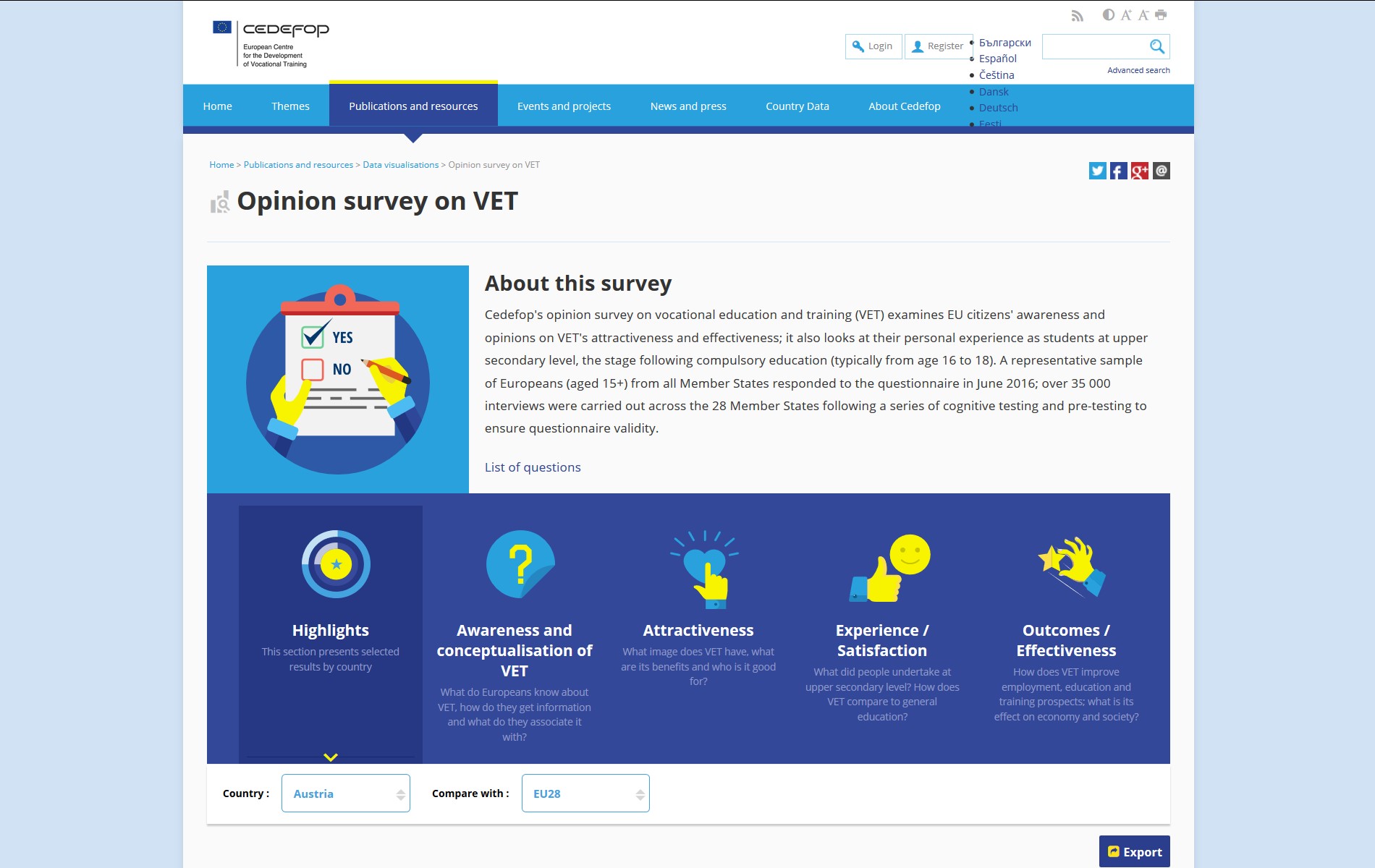 |
Opinion survey on VET Cedefop's opinion survey on vocational education and training (VET) is based on 35,000 interviews with Europeans (15 years and older) conducted in June 2016 in the 28 Member States. The aim of this survey on a representative sample basis was to obtain opinions of EU citizens on the attractiveness and effectiveness of vocational training as well as on personal experience and satisfaction as students at upper secondary level after compulsory education (usually between the ages of 16 and 18). Due to the differences between national and definitions used in the study, the results do not reflect the official participation figures. |
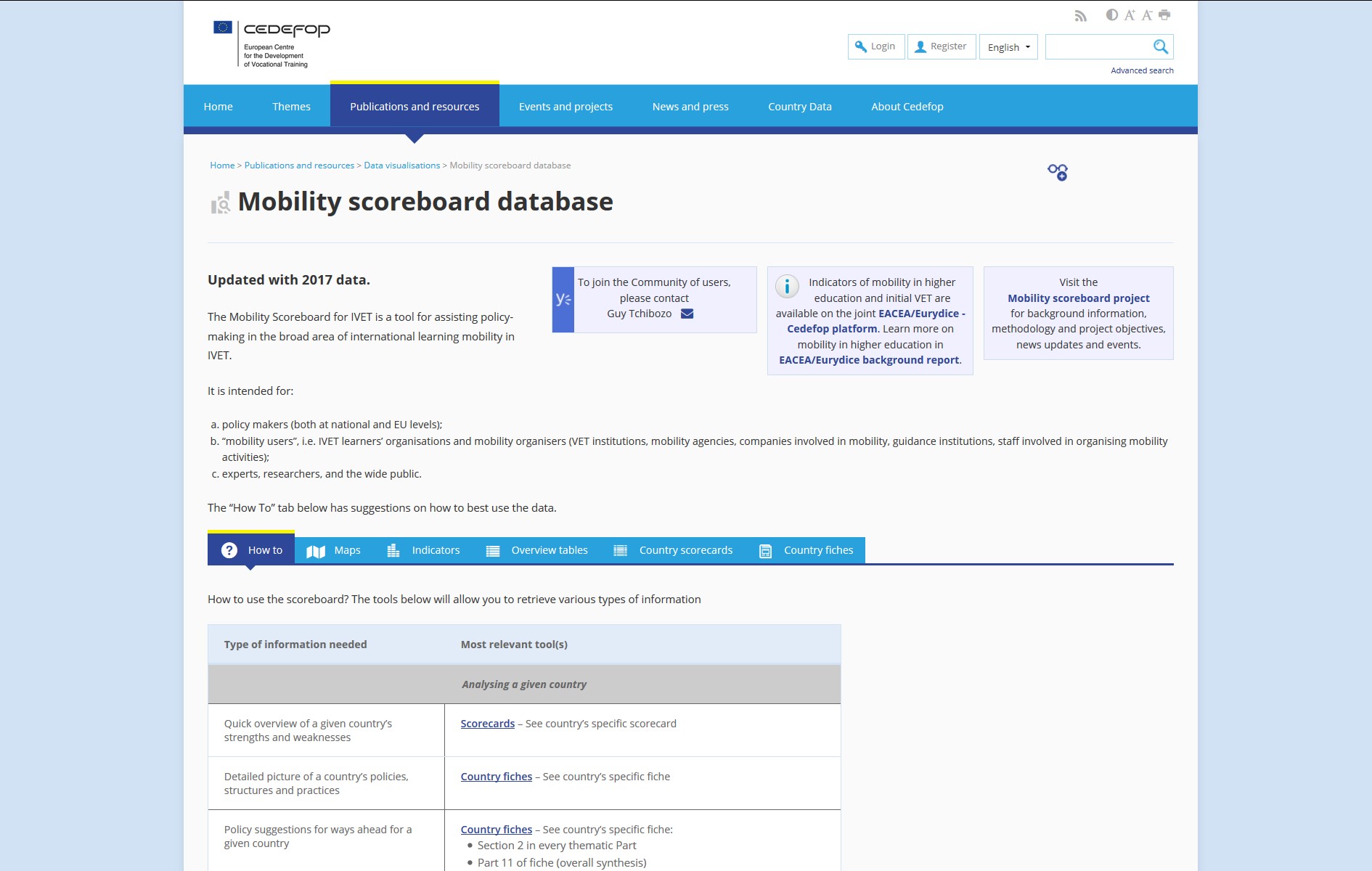 |
Mobility scoreboard The Mobility Scoreboard for IVET (updated with 2019 data) is a tool for assisting policy-making in the area of international learning mobility in IVET. It is intended for policy makers, “mobility users”, i.e. IVET learners’ organisations and mobility organisers (VET institutions, mobility agencies, companies, guidance institutions, staff involved in organising mobility activities) as well as experts, researchers, and the wide public. Various tools as e.g. scoreboards, country fiches, indicators and maps allow the user to retrieve overviews and detailed information about structures, policies and performances on a country specific and optionally on a cross-country perspective. |
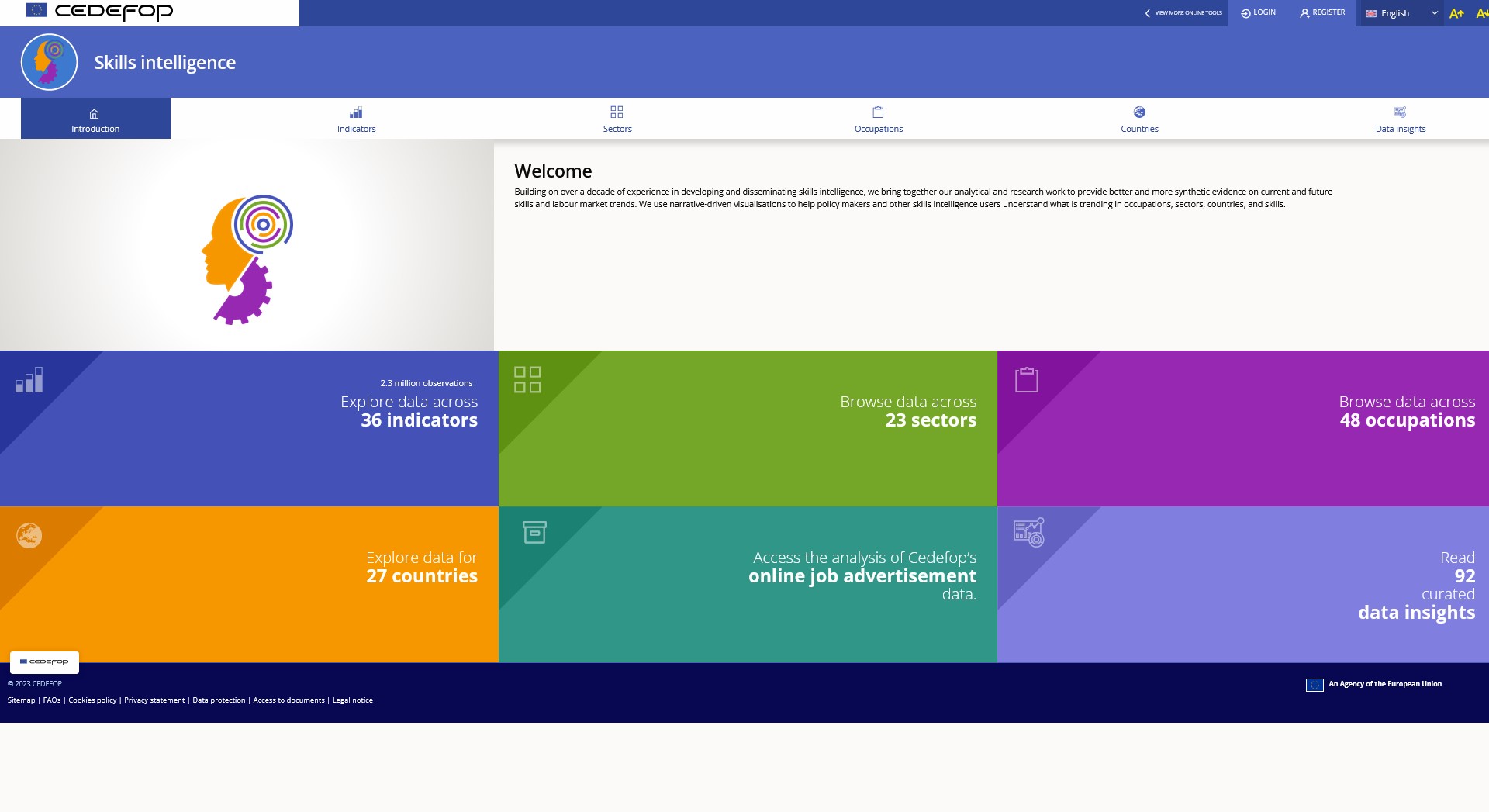 |
Skills Intelligence Skills Intelligence is a database collecting and providing data and information on skills and labour markets in the EU for policy-makers, policy-experts, researchers and guidance practitioners supporting their decision making on education, training and employment issues. Skills Panorama aims to foster the development of skill needs assessment and anticipation; which in turn, is a milestone for education and training systems becoming more responsive to labour market needs and for better matching of skill supply and demand across the EU. |
© 2026 Refernet

